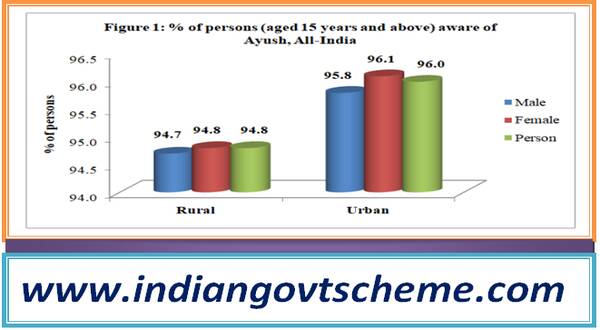Results of survey on ayush
Ministry of Statistics & Programme Implementation
RESULTS OF SURVEY ON AYUSH (July 2022 to June 2023) Released
Posted On: 13 JUN 2024 5:30PM by PIB Delhi
Key Findings
Approximately 95% of rural and 96% of urban respondents are aware of Ayush.
At least one member is aware of Medicinal Plants/Home remedies/Local Health Tradition/Folk medicine in about 85% of rural and 86% of urban households.
Around 46% of rural and 53% of urban individuals used Ayush for prevention or treatment of ailments in the past 365 days.
Ayurveda is the most commonly used system across both rural and urban areas for treatment.
Ayush is predominantly used for rejuvenation and preventive measures.
A. Introduction
The first exclusive all-India survey on ‘Ayush’ was conducted by the National Sample Survey Office (NSSO) from July 2022 to June 2023, as part of the 79th round of the National Sample Survey (NSS). This survey covered the entire Indian Union, excluding a few inaccessible villages in the Andaman & Nicobar Islands. Information was collected from 1,81,298 households, including 1,04,195 in rural areas and 77,103 in urban areas.
The broad objectives of the survey were to collect information on:
Awareness of people about the traditional system of healthcare (Ayush system of medicine), Uses of Ayush for prevention or treatment of ailments, Awareness of the households about home remedies, medicinal plants, local health tradition/folk medicine.
Additionally, the survey gathered information on household expenditure for treatments using Ayush medicine systems. The results (the factsheet along with the unit level data) are available on the Ministry’s website ([www.mospi.gov.in](http://www.mospi.gov.in)).
B. Sample Design
A stratified multi-stage sampling design was used in the survey on Ayush in which villages in the rural areas and urban frame survey (UFS) blocks in the urban areas or sub-units (SU) of villages or UFS blocks were regarded as the first stage units (FSU). The ultimate stage units (USU) were households in both the sectors. Simple Random Sampling Without Replacement (SRSWOR) was used for selection of the FSUs as well as households from the chosen FSUs.
C. Conceptual Framework
For the purpose of the survey, ‘awareness’ and ‘use’ of Ayush has been defined in a manner as described below:
A member of the household aged 15 years or more has been considered as “aware of Ayush” if one or more of the following are fulfilled:
If he/she has taken treatment using Ayush system of medicines anytime with or without prescription.
If he/she has heard about any of the Ayush system, namely, Ayurveda, Yoga, Naturopathy, Unani, Siddha, Sowa-Rigpa/Amchi, Homoeopathy – from family, friends, medical practitioner, Media (TV, radio, hoardings, newspapers & magazines, internet- Facebook/WhatsApp/ Twitter/IEC material through outreach camps, surveys of organizations, etc.), Research Articles/ Medical news-letter/ text books etc.
If he/she is/was aware about medicinal plants or plants having medicinal value, home remedies or traditional practices/folk practices for treatment or prevention.
If he/she is/was engaged by profession to Ayush healthcare centres/service providers in any one of the category: Registered Medical Practitioner, Unregistered Medical Practitioner, Midwife, Masseurs, Pharmacists, Yoga instructor, Panchakarma Therapists, Cupping Therapists etc. or involved in production/manufacturing of Ayush medicines.
‘Use of Ayush system of medicines’ refers to the use/adoption of one or more of the system(s) of Ayurveda, Yoga, Unani, Siddha, Sowa-Rigpa and Homeopathy for treatment/cure of diseases/ailments or for prevention of diseases/ailments on the advice of a medical practitioner/instructor. This will also include home based remedies/self-medication/self-treatment used by a member of the household knowing the preventive or beneficial effects of the treatment/medication.
D. Major findings of the survey:
1. Awareness of Ayush:
In rural India, about 95% male as well as female aged 15 years and above have been found to be aware about Ayush while in urban India it has been around 96%. Estimates of percentage of persons (aged 15 years or more) aware of Ayush system by gender at all-India level are shown in Figure 1.

About 79% of households in rural India and about 80% of the households in urban India have at least one member aware about medicinal plants and home medicines, while around 24% of the households have at least one member aware about folk medicine or local health tradition in both rural and urban India.
2.Use of Ayush:
Use of Ayush for prevention or treatment of ailments, during last 365 days has been observed to be more in urban areas than the rural areas. Figure 2 below depicts estimates of percentage of persons who have used Ayush for prevention or treatment of ailments, during last 365 days.

Both in rural and urban India, Ayurveda have been preferred over other systems of Ayush for prevention or treatment of ailments.
| Table 1: Percentage of persons used Ayush for prevention or treatment of ailments by system of medicine | ||
| System of medicine | Rural | Urban |
| Ayurveda | 40.5 | 45.5 |
| Others* | 9.4 | 12.8 |
| Any | 46.3 | 52.9 |
| *include Yoga & Naturopathy, Unani, Siddha, Sowa-Rigpa and Homoeopathy | ||
It has also been observed that Ayush has been mostly used for rejuvenation or preventive purpose followed by therapeutic or curative treatment.
3. Expenditure incurred for availing treatment of Ayush:
Estimates of average expenditure incurred per person for prevention or treatment of ailments using Ayush during the last 365 days for rural and urban India are given in Table 2.
| Table 2: Average expenditure (Rs.) per person for prevention or treatment of ailments using Ayush | ||
| System of medicine | Rural | Urban |
| Ayurveda | 394 | 499 |
| Others* | 622 | 592 |
| Any | 472 | 574 |
| *include Yoga & Naturopathy, Unani, Siddha, Sowa-Rigpa and Homoeopathy | ||
नोट :- हमारे वेबसाइट www.indiangovtscheme.com पर ऐसी जानकारी रोजाना आती रहती है, तो आप ऐसी ही सरकारी योजनाओं की जानकारी पाने के लिए हमारे वेबसाइट www.indiangovtscheme.com से जुड़े रहे।
